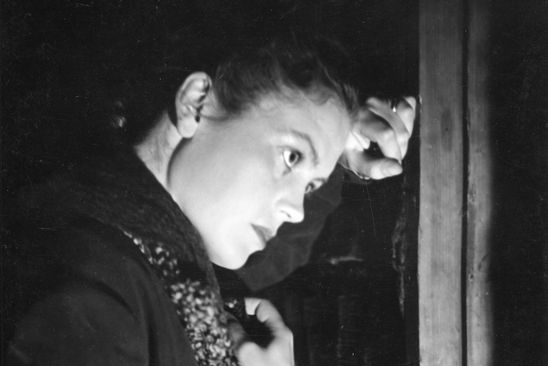Over the Border (1942) | The Official Schoolgirl Milky Crisis Blog


On a visit to see her aunt on the Finnish side of the border, Eliisa Raaska (Irma Seikkula) falls for local boy Mikko Vanhala (the decidedly unboyish Joel Rinne). She would very much like to marry him, but her father (director Wilho Ilmari, sneaking into his own film) refuses to leave his home on the Soviet side, where he is clinging to the memory of his late Ingrian wife. Mikko is unaware that his mother (Emma Väänänen) has promised his hand in marriage to Helka (Senja Lehti), the daughter of the local landowner Meller (Eino Jurkka), in settlement of a debt. But Mikko has already crossed to the Soviet side to ask for Eliisa’s hand, and when she accepts, brings her to his Finnish home.
In Finland, Eliisa meets with a frosty reception, since her presence puts Mikko’s mother back into financial straits. She stomps off to her aunt’s house, while Mikko arranges a loan to pay off the debt. Her father, meanwhile, was lying when he said he would follow her to Finland. Instead, he sets fire to his house and shoots himself. Mikko finds a distraught Eliisa and persuades her to return to Finland with him before the border-crossing loophole is permanently shut down by Soviet soldiers. Their friend, the border guard Gregor (Santeri Karilo), helps them escape by shooting Ivan (Vilho Siivola), the dastardly Soviet officer who covets Eliisa for himself. As Eliisa and Mikko reach safety on the Finnish side, they hear another gunshot, as Gregor takes his own life.

Suomi-Filmi’s big release for autumn 1942 was a film that tapped right into the zeitgeist, an adaptation of Urho Karhumäki’s 1938 novel about life on the Karelian isthmus, where the locals have repeatedly found themselves branded Russian or Finnish, Finnish or Russian, depending on where politicians in distant capitals are drawing lines on a map. With a mordant, contemporary topic and a score by Uuno Klami, Over the Border was Finland’s entry in that year’s “Venice Film Olympics”, where it won a minor medal, which the press regarded as something of a consolation prize.
“Over the Border was a deep, vivid and psychologically believable portrayal of humanity,” said the film critic of Uusi Suomi. “There was a real sense of the border in the air.” Meanwhile, Olavi Vesterdahl in Aamulehti thought it was a bit slow and lacking in action, but conceded that it did artfully demonstrate the way in which geopolitical concerns far above the heads of two people on either side of a humble barbed wire fence might suddenly render them unable to cross it – a matter of pregnant meaning to Finns in 1942, who were busily re-taking Karelia from the Russians who had stolen it, and would shortly have to hand it all back again. Deep down in Martti Larni’s script is a repeat of the idea that also surfaced in The Activists (1939), that people were people, and that there were surely good Russians like Gregor, too, although it was heavily implied that the bad ones like Ivan were hounding them to their deaths.

It was, perhaps, too tied to the zeitgeist. Delayed from its original release in April 1942, it enjoyed a brief moment in the sun and on theatre re-runs. When the Continuation War came to an end in 1944 and everybody started tiptoeing around the Russians like they were, well, a thin-skinned super-power with a penchant for false-flag attacks and land-grabs, it was very suddenly whipped out of cinemas, and was not seen again in Finland until the post-perestroika 1990s – compare to similar fates for The Activists and The Great Wrath (1939).
Jonathan Clements is the author of A Short History of Finland. He is watching all the Finnish films so that you don’t have to.








